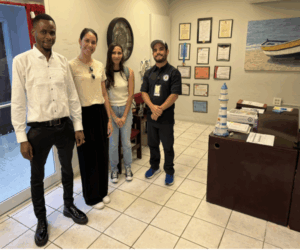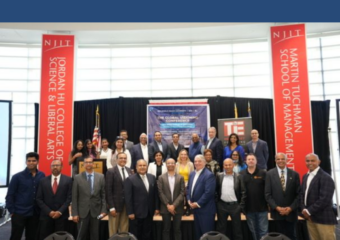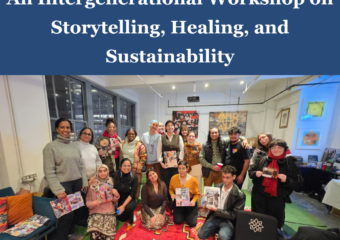CREST’s Doctoral Researchers Conduct Field Study on Flood Risk and Mitigation in Puerto Rico
Ana M. Mejia-Manrique and Eromosele Emmanuel Osuide, CREST doctoral students and R-SIRUS fellows, recently completed a research field trip to Puerto Rico to advance their studies on flood risk and resilience.
Ana’s research, Inland Flooding in Puerto Rico and the U.S. Virgin Islands, focuses on developing high-resolution flood risk maps by integrating updated Depth-Duration-Frequency curves with environmental factors such as soil, land use, and topography. Emmanuel’s work, A Community-driven Decision Support Framework for Nature-based Flood Mitigation in Puerto Rico:Integrating Social Vulnerability and Environmental Indices, aims to create a model that helps stakeholders select effective combinations of nature-based solutions (NBS) to reduce flood impacts. Both are in their second year of doctoral studies.

Ana and Emmanuel (L-R) meeting with Proyecto Enlace del Caño in San Juan
The field trip to Puerto Rico served multiple purposes for Ana and Emmanuel – familiarizing themselves with Puerto Rico’s flood-prone regions, meeting directly with agencies and community representatives, and gathering valuable local knowledge for their research. With assistance from Dr. Luisa Feliciano, Ana and Emmanuel were able to meet with organizations including Proyecto Enlace del Caño Martín Peña, the National Weather Service in San Juan, and the United States Geological Survey (USGS), and visit municipal emergency management offices to discuss local vulnerabilities. They also distributed surveys to gather primary data on flooding experiences and collect feedback on proposed nature-based solutions for flood mitigation as well as traveled to Isabela to observe dune restoration efforts and gain first-hand exposure to how NBS have been applied effectively for coastal flood mitigation.
The experience was enriching. “Personally, we strengthened our communication and networking skills by interacting with community representatives, municipal officials, and scientists from different organizations. These connections not only expanded our professional network but also gave us valuable experience in collaborating across different sectors. We also developed the ability to adapt to new environments and make the most of limited time in the field,” said Ana and Emmanuel.

Meeting at the Vega Baja Office of Emergency Management.
L-R: Emmanuel Osuide, Ana Mejia-Manrique, Dr. Luisa Feliciano, and Mr. Ángel Delgado (Director of the Vega Baja Office of Emergency Management). Photo credit: Research Team
Moving forward, Ana and Emmanuel will integrate field feedback, analyze survey data, and expand collaborations with municipalities to strengthen flood resilience research.
Ana and Emmanuel expressed gratitude to the CUNY CREST Institute for their support. They also thanked Dr. Reza Khanbilvardi, their advisor, for making the trip possible, and Dr. Luisa Feliciano for facilitating connections with agencies and municipalities.




